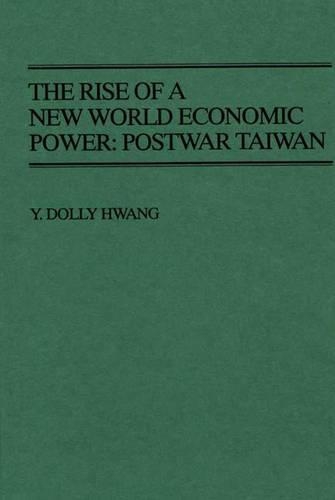
The Rise of a New World Economic Power: Postwar Taiwan
(Hardback)
Publishing Details
The Rise of a New World Economic Power: Postwar Taiwan
By (Author) Y. Dolly Hwang
Bloomsbury Publishing PLC
Praeger Publishers Inc
30th July 1991
United States
Classifications
Tertiary Education
Non Fiction
Macroeconomics
Development economics and emerging economies
Asian history
338.951249
Physical Properties
Hardback
176
Description
In this comprehensive analysis of Taiwan's economic development Y. Dolly Hwang traces the economic, political, and historical factors that enabled the island to transform itself from a poor country burdened with heavy foreign debta and rampant inflation into an emerging world economic power in a period of only 40 years. Hwang explores the role played by the cultural and individual aspirations of the Taiwanese; the improvements in political, social, and educational life that were made possible by the island's economic growth; Taiwan's growing contribution to the global economy; and the country's ability to rapidly narrow the technological gap between itself and the industralized nations. Throughout, Hwang emphasizes the dynamic interrelationships among the various factors that have created Taiwan's phenomenal success. Following an overview of Taiwan's postwar economic development, Hwang surveys events in Chinese history which laid the groundwork for Taiwan's rise to a world economic power. Hwang then devotes separate chapters to the influence of Taiwan's struggle for survival on its economic development, the role of government and the technocrats, and the contribution of specific economic policies, particularly the drive to develop an export-based economy. Subsequent chapters address industralization, international trade, Taiwan's monetary, fiscal and financial system, Confucianism and the capitalist spirit in Taiwan, entrepreneurs and small- to medium-sized enterprises, and the parts played by the United States and Japan in Taiwan's economic development. The concluding chapter looks at likely future scenarios for the island nation, including a possible reunification with mainland China. Students of economic history, economic development, and Asian Studies may find Hwang's study enlightening reading.
Reviews
Hwang provides a succinct and solid work on Taiwan's economic development. Simon Kuznets's theory of economic development (Postwar Economic Growth, 1984) is used to explain the transformation and development of a small island economy to a modern economy with significant global linkages. The book is free of abstract economic theory and jargon. The historical and institutional chapters provide the necessary background for the author to present and analyze a number of facets of Taiwan's accelerated development after the Chinese Nationalists assumed power. Students interested in economic development will find the government's role in the economy fascinating. Government policies are related to Sun Yat-sen's economic ideas and Confucianism; these policies are also shaped by Taiwan's contemporary institutions and resource problems. The chapter on industrialization includes a discussion of government planning and its commitment to stimulating the development of science and technology. Two chapters on international economics emphasize Taiwan's reliance on the global economy, and there is a nontechnical chapter on macroeconomic policy. The entire book is very readable and can be recommended to upper-division undergraduates and above.-Choice
"Hwang provides a succinct and solid work on Taiwan's economic development. Simon Kuznets's theory of economic development (Postwar Economic Growth, 1984) is used to explain the transformation and development of a small island economy to a modern economy with significant global linkages. The book is free of abstract economic theory and jargon. The historical and institutional chapters provide the necessary background for the author to present and analyze a number of facets of Taiwan's accelerated development after the Chinese Nationalists assumed power. Students interested in economic development will find the government's role in the economy fascinating. Government policies are related to Sun Yat-sen's economic ideas and Confucianism; these policies are also shaped by Taiwan's contemporary institutions and resource problems. The chapter on industrialization includes a discussion of government planning and its commitment to stimulating the development of science and technology. Two chapters on international economics emphasize Taiwan's reliance on the global economy, and there is a nontechnical chapter on macroeconomic policy. The entire book is very readable and can be recommended to upper-division undergraduates and above."-Choice
Author Bio
Y. DOLLY HWANG is President of Northern Pacific International, a consulting firm. Dr. Hwang received a Ph.D. from the University of Minnesota.
